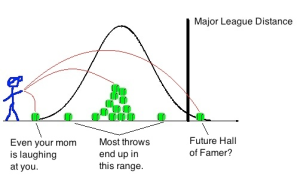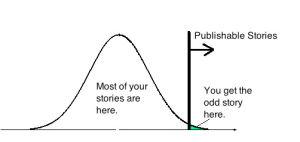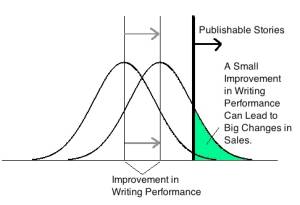It’s the first question we all get asked when we mention that we write fiction.
“Are you published?”
When you had to answer “no” or “not yet” people lost interest and gave you that polite smile that said, “Talk to me when you’re legit.” A sale takes that monkey off your back. You finally have some proof that someone else thinks your work is good enough to pay for. All writers crave that first sale.
But what is the difference between a published and unpublished writer? Is that single sale enough proof that you’re going to sell on a regular basis?
A look at the cold statistics can give a different perspective. A statistician would look at the problem and ask if there is enough data (one sale) to support the idea that a new norm (continually selling vs continually rejected) has been established.
I’ll spare everyone the formal statistics… Imagine you head out onto a baseball field and start throwing balls as far as you can. Most balls will land close to each other (your average throwing distance). As you throw more and more balls, there will be the odd throw where you mess up and the ball will land by your feet. Conversely, there will be the odd occasion where the arm speed, release, and the wind all combine perfectly and the ball soars over all your other balls to land at a major league distance.

Are you suddenly a pro-baseball player? No. Because when you throw the ball again and it is very likely that it will fall near your average distance. In statistics, this is called regression towards the mean: if you have an extreme result on one measurement, the following measurement will tend to be closer to the average.
So, as a writer, you have to look at that first sale and ask yourself: Am I writing at a semi or professional level or did I write so many stories that one, by chance, was good enough to be bought? Was selling my story an extreme result or part of a new norm?
The answer lies in the next story you submit. If it’s a rejection then you have yet to prove that your writing is better than a non-published author. You need to quickly get your head back into improving as a writer because the line between published writer and unpublished writer is more hazy than people think. Until you have overwhelming evidence (i.e. multiple sales) that you are consistently producing work that can sell, the statistics say that there is no evidence that your work is any different from someone who has never been published.

I don’t mean to discourage anyone or take away from the accomplishment of publication. Publication is a big deal that should be celebrated. But, if people focus their attention on the extremes (the odd sales that are occurring in spite of their writing ability) then they risk missing the point that development as a writer is on a continuum, not one giant step. If people focused on their average performance rather than the extremes then they’d walk out onto that ball field day after day and keep throwing. Eventually your skills will improve and the average distance thrown will be farther and those initial extreme results will eventually become the new norm.

Ray Bradbury provided some words of wisdom that I cannot find online, so I will paraphrase: He said, “If you want to be a professional writer, write a story and submit it for publication. It will probably be rejected. Take that rejection and pin it to the wall in your office. Write another story, submit, pin the rejection. By the time your office is covered in rejection slips, you will have made it as a writer.”
Published vs rejected are just labels, more indicative of whether a story found the right market rather than speaking to the quality of the story itself. Just write. Get feedback. Learn from it. The rest takes care of itself.
To me, Bradbury had perfect focus when developing as a writer. If rejections are the norm then don’t think of them as failures. Instead, think of them as proof that you are out there trying to be a better writer each day. Pile up enough rejections and you’ll get there. Published or not, we’re all in the same boat.